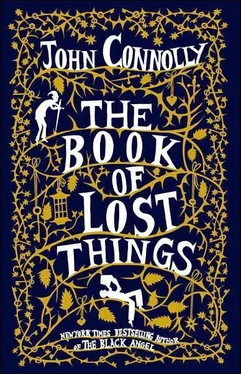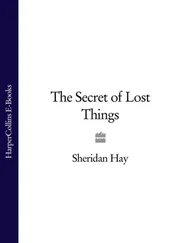Nevertheless, he slowly withdrew his sword as he rode and let it hang by Scylla’s side, ready to be used.
The forest was so thick with trees that the fortress was lost from sight as they passed through them, so it came as something of a shock to David when they finally emerged into the blasted landscape of fallen trunks. The force of the explosion, or whatever it had been, had torn the trees from the ground, so that their roots lay exposed above deep hollows. At the epicenter lay the fortress, and now David could see why it had appeared blurred from a distance. It was completely covered by brown creepers that wound around the central tower and covered the walls and battlements, and from the creepers emerged dark thorns, some easily a foot long and thicker than David’s wrist. It might have been possible to attempt to climb the walls using the creepers, but make even the slightest misstep and an arm or a leg or, worse, the head or the heart would be impaled upon the waiting spikes.
They rode around the perimeter of the fortress until they came to the gates. They were open, but the creepers had formed a barrier across the entrance. Through the gaps between the thorns, David could see a courtyard, and a closed door at the base of the central tower. A suit of armor lay upon the ground before it, but there was no helmet, and no head.
“Roland,” said David. “That knight . . .”
But Roland was not looking at the gates, or at the knight. His head was raised, and his eyes were fixed on the battlements. David followed his gaze and discovered what it was that had gleamed upon the walls from a distance.
The heads of men had been impaled upon the topmost thorns, facing out over the gates. Some still wore their helmets, although their face guards were raised or torn off so that their expressions could be seen, while others had no armor left at all. Most were little more than skulls, and, while there were three or four that were still recognizable as men, they looked as though they had no flesh left on their faces, just a thin covering of gray, papery skin over the bone. Roland examined each one in turn until, at last, he had stared into the faces of every dead man upon the battlements. He looked relieved when he was done. “Raphael is not among those that I can identify,” he said. “I see neither his face nor his armor.”
He dismounted and approached the entrance. Drawing his sword, he sliced off one of the thorns. It fell to the ground, and instantly another grew in its place, even longer and thicker than the one that had been severed. It grew so fast that it almost stabbed Roland in the chest before he managed, just in time, to step out of its way. Roland next tried to hack through the creeper itself, but his sword made only the slightest of cuts upon it, and the damage once again repaired itself before his eyes.
Roland stepped back and returned his sword to its sheath.
“There must be a way inside,” he said. “How else did that knight gain admittance before he died? We will wait. We will wait, and we will watch. In time, perhaps it will reveal its secrets to us.” They settled down after building a small fire to keep the cold at bay and maintained a silent, uneasy vigil on the Fortress of Thorns.
Night fell, or the greater darkness that merely deepened the shadows of the day and served as night in that world. The whispering from the forest, which had continued while they circled the fortress, abruptly ceased with the coming of the moon. The carrion birds disappeared. David and Roland were alone.
A faint light appeared in the topmost window of the tower and then was blocked as a figure passed before the opening. It paused and seemed to stare down upon the man and boy below, then disappeared.
“I saw it,” said Roland, before David could open his mouth.
“It looked like a woman,” said David.
It was the enchantress, he thought, watching over the sleeping lady in the tower. The moonlight shone upon the armor of the dead men impaled on the battlements, reminding him of the danger he and Roland now faced. They must all have been armed when they approached the fortress, yet still they had died. The body of the knight that lay inside the gates was huge, taller than Roland by a foot at least, and almost as broad as him again. Whoever guarded the tower was strong and fast and very, very cruel.
Then, as they watched, the creepers and thorns blocking the gates began to move. They unraveled slowly, creating an entrance through which a man could pass. It gaped like an open mouth, the long thorns poised like teeth waiting to bite.
“It’s a trap,” said David. “It must be.”
Roland stood.
“What choice do I have?” he said. “I must discover what happened to Raphael. I have not come all this way to sit on the ground and stare at walls and thorns.”
He placed his shield upon his left arm. He did not look frightened. In fact, he looked happier to David than he had been at any point since they had met. He had traveled from his own land to find an answer to his friend’s disappearance, tormented by what might have befallen him. Whatever now happened within the fortress walls, and whether he lived or died as a result, he would at last discover the truth about the end of Raphael’s journey.
“Stay here, and keep the fire burning,” said Roland. “If I have not returned by daybreak, take Scylla and ride as fast as you can from this place. Scylla is as much your horse now as mine, for I think she loves you just as she loves me. Remain on the road, and it will lead you eventually to the castle of the king.”
He smiled down upon David. “It has been an honor to travel these roads with you. If we do not see each other again, I hope that you find your home and the answers you seek.”
They shook hands. David did not shed a tear. He wanted to be as brave as he thought Roland to be. It was only later that he wondered if Roland was truly brave. He knew that Roland believed Raphael was dead, and that he wanted revenge upon whomever had killed him. But he also felt, as Roland walked toward the waiting fortress, that part of the knight did not want to live without Raphael, and that death, for him, would be preferable to a life alone.
David accompanied Roland to the gates. As they approached, Roland gazed up at the waiting thorns in apprehension, as though he feared they would close upon him as soon as he was within their reach. But they did not move, and Roland passed through the gap without incident. He stepped over the armor of the knight and pushed open the door of the tower. He looked back at David, raised his sword in a final farewell, and walked into the shadows. The creepers on the gates twisted, and the thorns extended, restoring the barrier across the entrance to the courtyard, and then all was still once more.
* * *
The Crooked Man watched what had transpired from his perch on the topmost branch of the tallest tree in the forest. The presences that dwelled within the tree trunks did not trouble him, for they were more scared of the Crooked Man than of almost any other being that dwelled in this land. The thing in the fortress was ancient and cruel, but the Crooked Man was older and crueler still. He stared down upon the boy seated by the fire, Scylla standing close by him, untethered, for she was a brave, intelligent horse and would not easily take fright or abandon her rider. The Crooked Man was tempted to approach David once again and ask him for the child’s name, but he thought better of it. A night alone at the edge of the forest, facing the Fortress of Thorns and watched over by the heads of dead knights, would make him more willing to bargain with the Crooked Man come morning.
For the Crooked Man knew that the knight Roland would never come out of the fortress alive, and David was, once more, alone in the world.
Читать дальше












